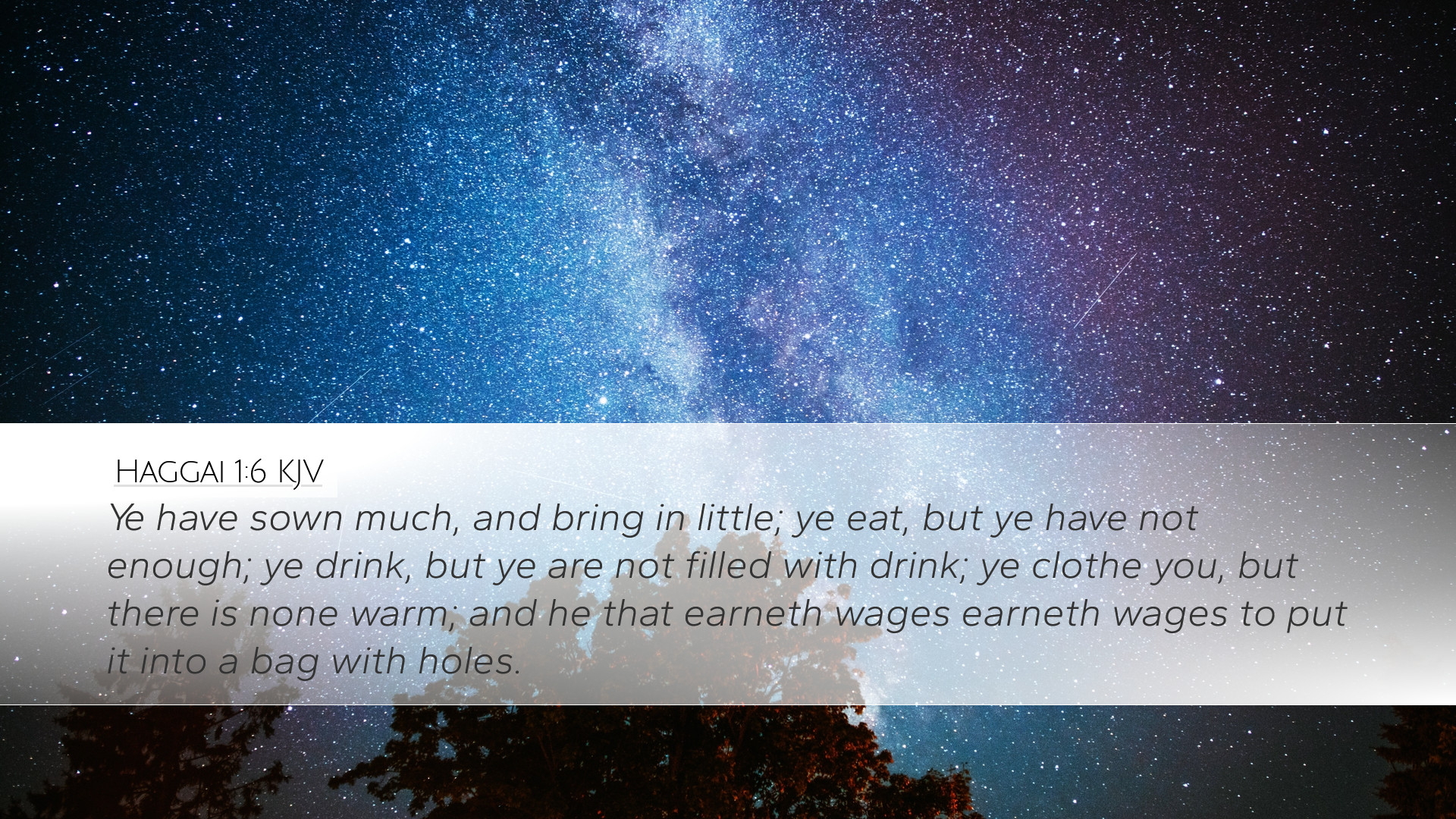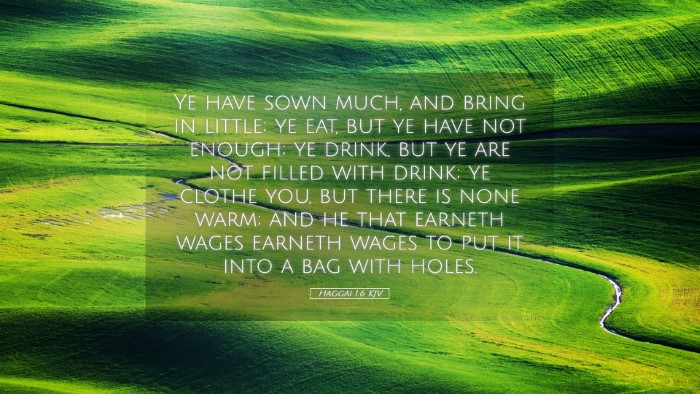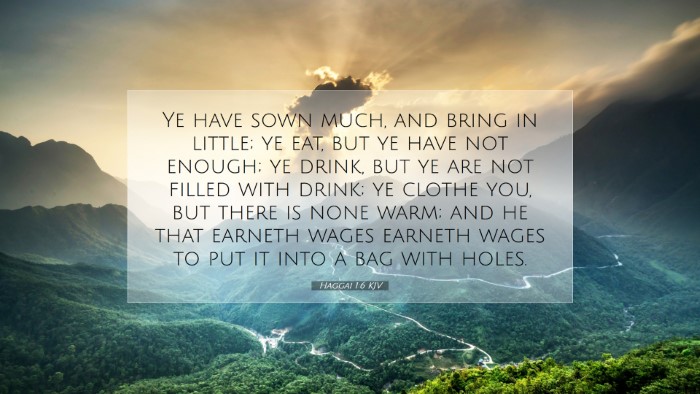Old Testament
Genesis Exodus Leviticus Numbers Deuteronomy Joshua Judges Ruth 1 Samuel 2 Samuel 1 Kings 2 Kings 1 Chronicles 2 Chronicles Ezra Nehemiah Esther Job Psalms Proverbs Ecclesiastes Song of Solomon Isaiah Jeremiah Lamentations Ezekiel Daniel Hosea Joel Amos Obadiah Jonah Micah Nahum Habakkuk Zephaniah Haggai Zechariah MalachiHaggai 1:6
Haggai 1:6 KJV
Ye have sown much, and bring in little; ye eat, but ye have not enough; ye drink, but ye are not filled with drink; ye clothe you, but there is none warm; and he that earneth wages earneth wages to put it into a bag with holes.
Haggai 1:6 Bible Commentary
Commentary on Haggai 1:6
Bible Verse: "Ye have sown much, and bring in little; ye eat, but ye have not enough; ye drink, but ye are not filled with drink; ye clothe you, but there is none warm; and he that earneth wages earneth wages to put it into a bag with holes." (Haggai 1:6)
This verse encapsulates the plight of the people during the post-exilic period, highlighting their spiritual and material struggles. The insights gathered from various public domain commentaries provide a profound understanding of the context and implications of this text.
Contextual Background
The Book of Haggai is set shortly after the return of the Jewish exiles from Babylonian captivity. The individuals addressed in this prophecy are the remnant community tasked with rebuilding the Temple in Jerusalem. However, they neglect this divine assignment, focusing instead on their own houses and affairs.
Exegesis of Haggai 1:6
The verse presents a vivid portrayal of the people's futile efforts through several key phrases:
- "Ye have sown much, and bring in little;" - This indicates the hard labor and effort put forth by the people, yet their harvest yields were disappointing.
- "ye eat, but ye have not enough;" - Reflects a spiritual and physical hunger that is not satisfied by the provision they strive to secure.
- "ye drink, but ye are not filled with drink;" - Suggests a perpetual thirst, not only for physical water but metaphorically for spiritual sustenance.
- "ye clothe you, but there is none warm;" - Indicates the insufficiency of material goods to bring true comfort.
- "he that earneth wages earneth wages to put it into a bag with holes." - This profound metaphor illustrates financial struggle and loss; the earnings are insufficient to meet needs, as if they are being wasted.
Theological Implications
Commentators such as Matthew Henry and Albert Barnes emphasize that these struggles were a direct consequence of the people's neglect of God's house. The theological implication is clear: prioritizing worldly concerns over divine mandates leads to spiritual emptiness and physical deficiency.
Matthew Henry's Insights
Matthew Henry asserts that this verse highlights the restless pursuit of comfort and satisfaction outside of a right relationship with God. He notes that the people's materialism ultimately left them unfulfilled, implying that spiritual disobedience leads to practical hardship.
Albert Barnes' Perspective
Albert Barnes elaborates that the people's hardship serves as a chastening from God. He illustrates that their spiritual neglect resulted in tangible misfortune, reinforcing the principle that disobedience leads to a lack of blessing in all areas of life.
Adam Clarke's Commentary
Clarke points out that the statement about "earning wages to put into a bag with holes" emphasizes a divine principle of stewardship—when individuals are not grateful or responsible with what they have, they bear the consequences of their mismanagement. Clarke encourages readers to consider their own lives and examine where blessings might be squandered.
Practical Lessons for Today
The application of Haggai 1:6 stretches beyond its historical context and resonates with contemporary believers:
- Prioritize God First: Just as the Israelites were reprimanded for neglecting the Temple, believers today must ensure that God's work is prioritized in their lives.
- Evaluate Daily Efforts: Are we pouring ourselves into endeavors that bear little fruit? It may be a call to refocus on spiritual investments.
- Recognize Spiritual Poverty: Physical blessings cannot replace the need for spiritual fulfillment; continual discontent may indicate a need for repentance.
- Understanding Stewardship: Evaluate the management of time, resources, and talents as gifts that should honor God.
Conclusion
Haggai 1:6 serves as a poignant reminder of the consequences of neglecting divine priorities. Through the insights of revered commentators such as Matthew Henry, Albert Barnes, and Adam Clarke, believers are encouraged to reflect deeply on their walk with God, ensuring that their lives are not characterized by futility and dissatisfaction but rather by fulfillment in obedience and service to the Lord.
Reflection Questions
To foster further contemplation, consider the following questions:
- In what ways am I prioritizing my daily concerns over fulfilling God's calling?
- What areas of my life reflect a scarcity of spiritual fruit?
- How can I restructure my resources to align with God's work more effectively?


